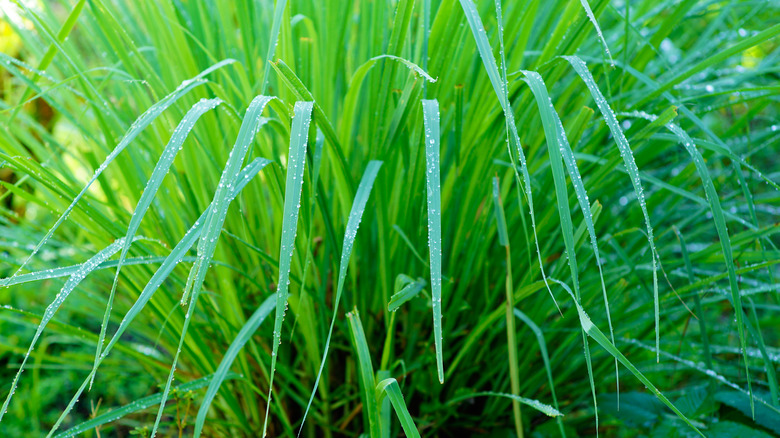Keep Mosquitoes Out Of The Garden With A Fresh-Smelling Herb They Can't Stand
You're finally settling into a quiet evening outdoors when you feel it: The telltale itch of a mosquito bite. Within minutes, you're swatting at thin air, wondering how these tiny pests always seem to find you. But what if the solution isn't a harsh chemical spray, but a fragrant herb hiding in your garden bed? Mosquitoes are responsible for over a million deaths each year. Diseases like malaria, dengue, and yellow fever continue to spread through mosquito bites, making these insects one of the most dangerous threats to global health.
These pesky insects find you by locking onto scent, specifically the carbon dioxide you exhale and the lactic acid on your skin. Citronella throws that entire system off. The strong, citrusy scent of this natural oil can overwhelm a mosquito's receptors, blocking the chemical signals they use to track humans. That's why citronella oil has become a go-to ingredient in natural mosquito repellents, whether it's in sprays, lotions, or patio candles.
Citronella oil is most famously sourced from a certain type of lemon-scented grass like Cymbopogon nardus, which is packed with the mosquito-repelling compound citronellal. However, relying on citronella alone won't always be enough to keep mosquitoes completely at bay. Its effects are temporary, and the scent tends to fade quickly outdoors. For better results, it helps to combine citronella with other strategies, like removing standing water or planting a mix of other mosquito-repelling plants such as rosemary or catnip.
How to use citronella as a mosquito repellent
Start by planting citronella in a spot where it can actually help — along patios, near seating areas, or at the edges of garden beds. (And make sure not to confuse true citronella with the 'Citronella' scented geranium.) Citronella grows best in USDA Hardiness Zones 10 to 12, with at least six hours of sunlight and well-drained soil. However, to get the most mosquito-repelling power, you'll need to release the oils from the leaves. About 30 minutes before you spend time outside, pick a few fresh leaves and crush them gently.
You can scatter the bruised leaves on patio tables, tuck them into mesh bags, or place them in small bowls near where people gather. As the scent fills the air, it helps mask the smells mosquitoes use to find you. For a longer-lasting effect, try making a simple citronella spray. Combine 2 cups of witch hazel, a ½ teaspoon of citronella essential oil, and 1 tablespoon of apple cider vinegar in a spray bottle.
Shake well before each use and mist it around doorways, patio furniture, or any outdoor area where mosquitoes tend to lurk. Keep in mind that citronella's aroma fades rapidly outdoors, so refresh your crushed leaves or reapply the spray every hour or so. One important thing to keep in mind is that the citronella plant is toxic to dogs and cats. If they chew on the leaves or get into the oils, it can make them sick. Try to keep your pets away from any citronella plants in the garden, and don't use sprays or candles in spots where they usually hang out.

